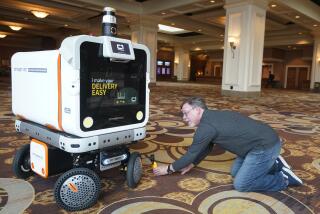Gates Unveils New ‘Smart’ PC Devices
- Share via
LAS VEGAS — Microsoft Chairman Bill Gates preached the wonders of “smart” personal computing devices that can link up with the home of the future by demonstrating some new gadgets at the Consumer Electronics Show here on Wednesday.
Gates displayed Microsoft’s new Pocket PC, which includes a mini Web browser that can receive and send e-mail, as well as display video programming downloaded from Microsoft’s interactive WebTV service. Microsoft describes this as the next major advance in hand-held devices, but it will also compete against 3Com’s stunningly popular Palm Computing organizers.
Microsoft is providing a new generation of Windows CE operating software for the Pocket PC, but the device will be made by other manufacturers.
Gates also unveiled the company’s electronic book reader, or eBook Reader, a new software application that will be packaged with the Pocket PC that enables people to read books on its palm-sized computer screen. Microsoft claims this is a huge technical breakthrough that uses clear-type technology developed by Microsoft researchers.
Microsoft will ship its Pocket PCs and eBook Reader software this spring.
“The resolution of text on screen now rivals the printed page,” said Craig Mundie, Microsoft’s senior vice president for consumer strategy. “That’s never been true before, and that’s why people haven’t been able to get into reading books on screens.”
Microsoft also plans to announce a deal today with Barnes & Noble that would offer books in a digital format. People would download them onto their personal computers or palm-sized devices, company officials said.
Gates also used the show to release version 2.0 of MSN Mobile, the company’s Internet access software to be used by various cell phone makers. The new version offers interactivity between browser-equipped phones and Microsoft-sponsored Web sites.
And Gates introduced the company’s “digital diva,” Stacy Elliott, who is now Microsoft’s consumer ambassador.
Elliott greeted those at the convention from the plush new confines of Microsoft’s house of the future, which is located at the company’s Redmond, Wash.-based campus. The new Microsoft Home is designed to show how home automation and computer networking can make a difference in people’s lives.
In a Webcast, Elliott demonstrated how a system of networked computers using touch-screen panels or palm-sized computing devices can control the home’s lighting, shading, temperature, music and television with a touch of a button.
Soon, Mundie says, refrigerators, recycling bins, wash machines, finances, entertainment and information all will be connected by computing devices.
Microsoft’s future prosperity depends partly on how well consumers buy into this vision of networked computers making their home life more simple, their business life more productive and their entertainment world more personal.
But many industry experts remain skeptical that the home computer networks will attract mass-market appeal any time soon. The demand for such gadgets is confined to about 15% of the U.S. population, according to a Gartner Group study.
“I think the idea of networking computers and networking home control really has limited appeal,” said Mark Snowden, a senior analyst for GartnerGroup. “At this point, it’s more hype than market.”
But Snowden added that Microsoft has no choice but to embrace this uncertain market.
The Internet Age has diminished the role of the personal desktop computer, forcing Microsoft to spread its bets over a constellation of new digital devices including mainframe servers, game machines, hand-held personal organizers, smart cell phones and interactive pagers.
Microsoft has placed huge bets over an array of future businesses from wireless to cable to interactive WebTV and its new industrial-strength server software, Windows 2000. Still, much rides on Gates’ ability to create enthusiasm for these new consumer-oriented products.
“He’s got to evangelize all of these new technologies,” Snowden said. “Who else has $20 billion to create a new market?”





